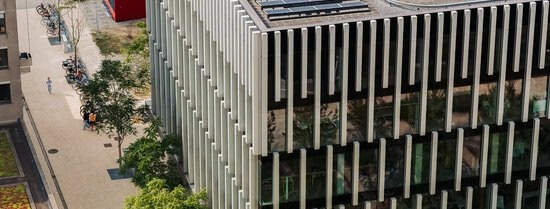Join us at Erasmus University Rotterdam, for the insightful ‘Marketing Research meets Marketing Practice’ event, organised by the marketing department of Erasmus School of Economics, in collaboration with the Dutch Institute for Marketing (NIMA) and its affiliates, RM and SMP.
The theme of the day will focus on how emerging technologies and innovative strategies are transforming the marketing landscape. Four presentations by leading Erasmus School of Economics marketing professors will cover topics such as new business models in platform markets, influencer marketing, the use of customer insights for innovation, and simulating market research data with Large Language Models (LLMs). These talks will provide valuable insights for both academic and professional marketers.
Bringing together experienced practitioners and marketing scientists, this event fosters a unique exchange of knowledge and ideas between the worlds of research and real-world application. After the presentations, participants will engage in discussions on the practical applications of the research findings, offering a rich opportunity for collaboration.
This event is invitation-only.
Presentations
Following the digitalisation of marketplaces and the subsequent dominance of powerful online platforms like Amazon or Google, many brands have developed their own platforms to regain control and direct access to their consumers. Sports brands such as Nike, for instance, launched product customisation platforms that allow personalised purchases. Software brands such as Microsoft launched subscription platforms that shift the focus from product ownership to product access. Van Crombrugge’s talk will combine insights from his research on how this platformisation of brands and their new business models have disrupted the market structure of multi-firm marketplaces. Based on a value creation-value appropriation framework, van Crombrugge posits that branded platforms are a double-edged sword, given that the value that they create often forces all market players to contest for their piece of the pie.
Andreas Bayerl's research explores how firms can generate revenue efficiently through influencer marketing on Instagram, TikTok and the like. The study reveals that partnering with influencers who have smaller followings (so called nano- or micro influencer) results in a higher return on investment compared to those influencers with larger followings (so called macro- or mega influencer). These findings provide valuable insights for businesses in selecting the most effective influencers for their marketing campaigns.
In Camacho and Stremersch’s research, they synthesised five decades of academic research, surveyed 305 innovation managers, and interviewed twelve executives from top market research agencies like Ipsos, Nielsen, Kantar, IQVIA, and GfK to help firms use customer insights for innovation. Next, they created a framework that offers guidance on how firms can effectively gather data, extract insights, and act on these insights when making innovation decisions. Their findings highlight that companies often underuse customer insights for innovation. This is especially true for customer insights domains that require active customer involvement, such as crowdsourcing and co-creation. They provide recommendations to help firms to benefit from customer insights and avoid missing innovation opportunities.
The research of Martijn de Jong, co-authored with Bas Donkers, focuses on automated market research leverages Large Language Models (LLMs) to simulate human responses in market research tasks. This methodology can efficiently generate insights on for instance brand perceptions, attitudes, and behaviour. The agreement rates with traditional human surveys vary from context to context, but by speeding up the research process and reducing costs, LLM-based approaches promise to enhance the scope of market research, making it possible to explore more detailed and varied questions without relying solely on human participants.
Programme
| 15:00 | Reception (Restaurant Van der Goot Building, 3rd floor, M3-09 – M3-11) | |
|---|---|---|
| 15:30 | Programme start with welcome | |
| Combined session A | (Forumzaal Van der Goot Building, 3rd floor, M3-15) | |
| 15:45 | Session topic 1 by Michiel van Crombrugge | |
| 16:15 | Session topic 2 by Andreas Bayerl | |
| 16:45 | Questions and discussion | |
| 17:00 | Network and Coffee Break | |
| Combined session B | (Forumzaal Van der Goot Building, 3rd floor, M3-15) | |
| 17:30 | Session 3 by Nuno Camacho and Stefan Stremersch | |
| 18:00 | Session 4 by Martijn de Jong and Bas Donkers | |
| 18:30 | Questions and discussion | |
| 18:45 | Wrap up | |
| Dinner | (Q-Building, Q-lounge GF, ground floor) | |
| 19:00 | Dinner is served and available for self-service | |
| 20:00 | End of programme |

